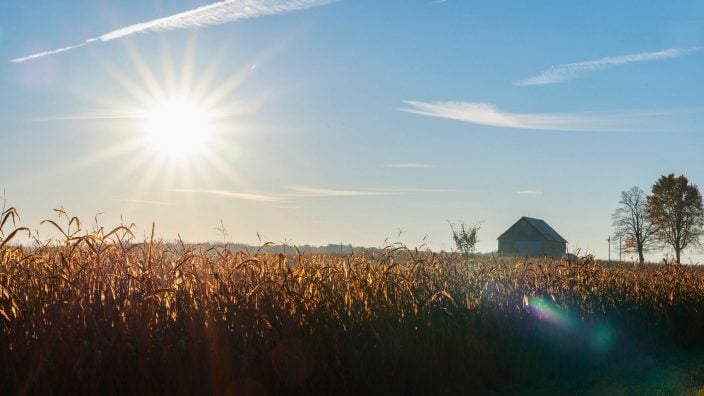Legal with Leah: Changes to CAUV woodland values
As Ohio Farm Bureau Policy Counsel Leah Curtis notes in this Legal with Leah, these changes should result in significant tax savings for many Ohio woodland owners.
Read MoreLearn all about the basic laws, exemptions and considerations you should make when it comes to overtime.
We continue a series of Legal with Leah Podcasts on the topic of labor. We have covered minimum wage and minors in the workforce. Now we move to overtime laws with Leah Curtis, policy counsel for Ohio Farm Bureau. Learn all about the basic laws, exemptions and considerations you should make when it comes to overtime.
Listen to Legal with Leah, a podcast featuring Ohio Farm Bureau’s Policy Counsel Leah Curtis discussing topics impacting farmers and landowners.
Ty Higgins [00:00:00] There are some new labor resources for Ohio Farm Bureau members online at ohiofarmbureau.org that are part of a larger project called the Ag Intelligence Service, a joint initiative with the Ohio Farm Bureau Federation and Nationwide. These new resources include a labor intelligence report and a guide to finding, hiring and retaining farm employees. We continue a series of Legal with Leah podcasts on the topic of labor. We’ve covered minimum wage, and minors in the workforce, and now we move to overtime laws with Leah Curtis, policy counsel for Ohio Farm Bureau.
Leah, what is the basic law on overtime?
Leah Curtis [00:00:35] Most people know and are well aware that in general, with overtime, once an employee reaches 40 hours a week, there’s a provision that that employee will get paid overtime for any additional hours, and that generally is going to be the pay that is one and one half times whatever their regular rate of pay would be.
Ty Higgins [00:00:53] Overtime has been around for a long time, but there are some exceptions to that law.
Leah Curtis [00:00:58] Overtime was actually a part of the Fair Labor Standards Act, which is our kind of basic labor law in this country. And it was passed as a part of the New Deal in 1938. So it’s been around for a long time and there are exemptions for various types of employees or jobs, including those who are considered executives, those who are outside sales employees. Generally, those exemptions are going to be based on a series of tests related to what the job’s duties are, and then also may be based on what the salary is for that job, or whether that job pays above a certain amount.
Ty Higgins [00:01:27] Is there an exemption for agriculture?
Leah Curtis [00:01:30] Yes. So the Fair Labor Standards Act has always provided an exemption from overtime to agricultural workers. And this means that those employees who are employed in agriculture would not be entitled to an overtime pay generally under the law.
Ty Higgins [00:01:44] One thing to be careful of though, you mentioned it very carefully in your statement there, what that means to be employed in agriculture.
Leah Curtis [00:01:51] So this exemption is based on the Fair Labor Standards Act, and any time we’re talking about labor law, we need to remember that the definition of agriculture for the Fair Labor Standards Act, it is generally somewhat narrow. So it is employees who are standing in for what the farmer would normally do in their normal course of farming. And it has to be work that’s incidental to and in conjunction with the actual farmer’s farming operation. So this can sometimes cause an issue if people are doing kind of more ancillary type activities.
Ty Higgins [00:02:22] Need to be pretty thoughtful too, about what types of duties you might have your employees doing, particularly when you may have an operation that goes beyond just typical farming.
Leah Curtis [00:02:32] Yeah, I mean, we love the ingenuity of many of our farmers. They add lots of different aspects to their farm. And so we do have some of those auxiliary or additional activities that maybe aren’t farming per se, those employees, because of those duties, they may not be exempt from overtime or even minimum wage like we talked about earlier. So if an employee is going between those traditional farming type jobs and other ones, that could end up making them subject to different labor laws for an entire period if they are switching between things.
Ty Higgins [00:03:05] So does that also mean that ag-related businesses may not be able to use the exemption?
Leah Curtis [00:03:10] So this is important because while we typically think of a lot of agribusinesses as just agriculture for purposes of labor law, they may not fall under this category. That doesn’t mean there won’t be other exemptions that apply to them or other provisions that apply specifically to the types of jobs or duties that they have. But these ag exemptions are going to be more applicable to that per se farming type of activity.
Ty Higgins [00:03:36] So as employers plan out their positions and their payroll, really something to consider.
Leah Curtis [00:03:41] It’s always a good idea when you are hiring people, when you’re setting up your human resources to visit with some professionals, lawyers, maybe some consultants that can help you work through all these types of questions, make sure any employees are categorized correctly. And again, while this is an exemption, an employer should also always consider how does this fit within your business plan, with your benefit offerings, with the local labor market and the types of people that you are drawing that you want to draw to these positions and who you want to work in these positions.


As Ohio Farm Bureau Policy Counsel Leah Curtis notes in this Legal with Leah, these changes should result in significant tax savings for many Ohio woodland owners.
Read More

In the case O’Connor v. Eubanks, the question is, can a state be sued in federal court when it takes a property?
Read More

A new low risk license should bring consistency across Ohio in regard to nonmechanical refrigeration.
Read More

The law requires most businesses to report information about their beneficial owners, and the intent is to try to make it harder to illegally hide assets and commit financial crimes.
Read More

How will this impact Ohio farmers and what can be done to allow for use of the products that have already been purchased?
Read More

What are some of the things landowners need to be aware of, as they might see more people wanting to come out to their property and to rural Ohio for the best seat in the house?
Read More

How will passage of Issue 2 impact agribusinesses and farm employers?
Read More

Policy Counsel Leah Curtis discusses Ohio trespassing laws and the liability that can fall on landowners when people enter their property.
Read More

When property owners may have issues with trees or encroachment on their property, they often turn to Ohio Farm Bureau for information.
Read More

Even though there can be zoning in rural areas of Ohio, there are limitations in the law when it comes to agriculture.
Read More